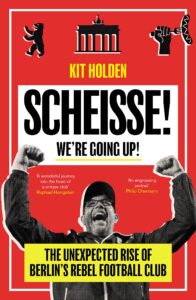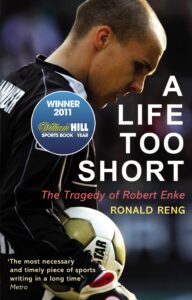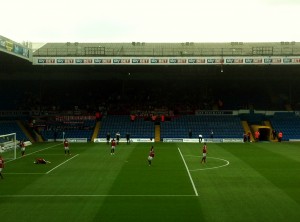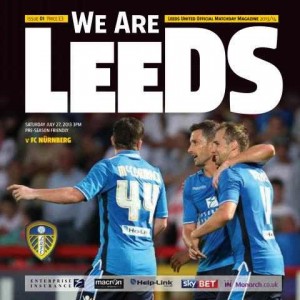 This book was originally published in Spanish as FC Sankt Pauli and in Catalan as Sankt Pauli: un alter futbol és possible, in 2017. The English language edition was published in late 2020 by Pluto Press, “an independent publisher of radical, left-wing non-fiction books”, wholly appropriate for the unique club that is FC St. Pauli.
This book was originally published in Spanish as FC Sankt Pauli and in Catalan as Sankt Pauli: un alter futbol és possible, in 2017. The English language edition was published in late 2020 by Pluto Press, “an independent publisher of radical, left-wing non-fiction books”, wholly appropriate for the unique club that is FC St. Pauli.
Content wise it is divided into five major parts, titled, Informal Beginnings, War and Peace: From the Third Reich to the Bundesliga, A Club of Belief: The pirates of the league, Terraces with Conscience and St Paulinism Without Borders, with an Epilogue, Against Modern Football. The chapters within each section provide context for the club that St. Pauli is today. Therefore readers are presented with a timeline which takes at its beginning a brief history of football in Germany from the second half of the nineteenth century and the establishment of the early football clubs in Hamburg, before the official formation of St. Pauli in 1910, following the club and the social and political machinations within Germany and the Hamburg district through to the end of the 2015/16 Bundesliga 2 season.
As a result, this is no simple season-by-season summary of St. Pauli, instead this is a book which has the feel of an academic read, with copious footnotes, an extensive bibliography and index as authors Carles Vinas and Natxo Parra use social history, politics and football to tell the story of a club that despite no significant record of honours and is overshadowed by its city neighbour, HSV Hamburg, has a global following.
What sparked this, can essentially be traced back to the 1980s “thanks to young group of people from the autonomous, punk and squatting movements who began turning St. Pauli into the cult club it is today”. They created a club that opposed to racism, sexism and homophobia, and fought against fascism and right-wing extremism and which today are still central values of Sankt Pauli and has spawned Official fan clubs around the world, fighting and supporting similar causes.
However, the authors acknowledge that whilst these tenets have attracted fans who empathise with these ideals, it has also made the club trendy, with merchandise of the St. Pauli skull and crossbones, a must-have item for tourists and visitors to the Millerntor Stadium. And this is the modern day conundrum for St. Pauli – is the club one that is striving for playing in the top-division in Germany and entry into European competitions, which would require major financial input and down a route of commercialism or is it a club just happy to play at whatever level but sticking to supporting its causes and values. The fact remains that St. Pauli fans today “have the power to veto team sponsors thanks to the club’s management model” so are a significant force in terms of decision making at the club, something a million miles away from the vast majority throughout the world.
In closing the book, the Epilogue, Against Modern Football, is a discourse about how capitalism has ruined the game, detailing a blunt assessment of the realities of the sport today. One only has to look at the game in England, with the Premier League and the Sky TV contract, to see that football has been turned into a global business, where clubs are detached from its working-class roots, history and location, with ordinary fans priced out of attending games and indeed are now nothing more than consumers, with oligarch owners only interested in profit and making their club a global brand.
St. Pauli continue to show that there is a way for clubs to have a social conscience, to connect once again with its community, with fans playing their part, but how many other clubs and their supporters would swap their league titles and cups for a more democratic and socially responsible way? Maybe as has been the case here in England, there is an answer to been found at the non-league level of the game, where during 2020 and the COVID crisis, these clubs run by volunteers, got out into and connected with their respective communities, providing food and support in checking on the old and vulnerable as well as a range of other social projects.
Real Fans, Real Clubs, Real Football.
(Pluto Press. October 2020. Hardback 253 pages)
 A CLUB ON THE RISE.
A CLUB ON THE RISE. On 10 November 2009 the German national goalkeeper, Robert Enke, stepped in front of a passing train. He was thirty-two years old and a devoted husband and father.
On 10 November 2009 the German national goalkeeper, Robert Enke, stepped in front of a passing train. He was thirty-two years old and a devoted husband and father.

 Neither side made any substitutions at the break, but the second period, despite no changes in personnel had a different tempo. Within the opening fifteen minutes of the half, there was a flurry of chances as Feulner and Ginczek had efforts on goal for the visitors and McCormack and Varney responded for Leeds. There was also a bit of ‘hand-bags’ as McCormack and Dabanli tangled which sparked a skirmish in which both keepers became involved in. Once this all calmed down, both teams started to introduce a number of substitutes just after the hour mark which meant the game struggled for any flow thereinafter. However, with twenty minutes remaining, Leeds once again conceded at a set-piece. German Under-21 international Marvin Plattenhardt took the corner, which was flicked on by Berkay Dabanli to provide an easy header from just inside the penalty box for man of the match Ginczek. More substitutions took place which included a home debut for Matt Smith, but the Germans continued to look dangerous and created two very good chances late on for Niklas Stark and American International Timothy Chandler as the game went into the last ten minutes.
Neither side made any substitutions at the break, but the second period, despite no changes in personnel had a different tempo. Within the opening fifteen minutes of the half, there was a flurry of chances as Feulner and Ginczek had efforts on goal for the visitors and McCormack and Varney responded for Leeds. There was also a bit of ‘hand-bags’ as McCormack and Dabanli tangled which sparked a skirmish in which both keepers became involved in. Once this all calmed down, both teams started to introduce a number of substitutes just after the hour mark which meant the game struggled for any flow thereinafter. However, with twenty minutes remaining, Leeds once again conceded at a set-piece. German Under-21 international Marvin Plattenhardt took the corner, which was flicked on by Berkay Dabanli to provide an easy header from just inside the penalty box for man of the match Ginczek. More substitutions took place which included a home debut for Matt Smith, but the Germans continued to look dangerous and created two very good chances late on for Niklas Stark and American International Timothy Chandler as the game went into the last ten minutes.